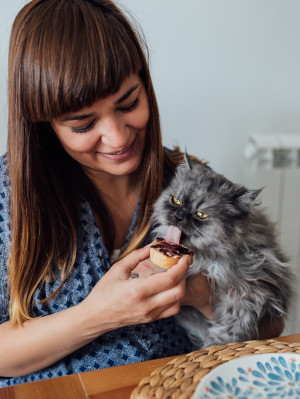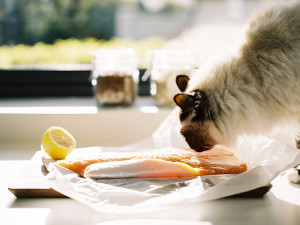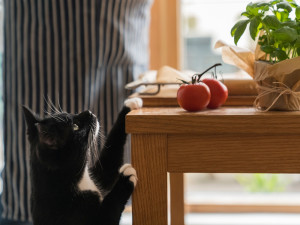Can Your Cat Eat Honey? The Benefits and Drawbacks of Honey for Cats
What’s good for the pet parent isn’t always good for their kitty.

Share Article
In This Article:
What Is Honey? Can Cats Consume Honey? The Risks of Cats Consuming Honey Alternatives to Honey for Cats
It feels like every day scientists, doctors, or nutritionists are discovering new and exciting uses for honey. Whether it’s being used as a natural sweetener or an antimicrobial wound healer, honey has many benefits for humans, which can make you wonder if our cats shouldn’t be getting in on some of that sweetness.
But here’s an important reality check: Cats really shouldn’t eat honey — nor may they even want to. Still, in some cases, honey may be beneficial to them. When is it good for them, and when is it bad? Read on to find out.
Main takeaways
Although honey has many positive uses for humans, that benefit doesn’t always apply to cats.
In general, cats shouldn’t eat honey because it is very high in sugar and can cause digestive issues. It may also expose them to botulism.
However, honey may provide some benefit to cats in wound care or to increase the energy density of foods.
Consult your veterinarian before giving your cat honey.
What is honey?
You may hear honey referred to, unappetizingly, as bee vomit. While that’s not entirely true, it is a product made by honey bees from the nectar of flowers. It is a very important product for these insects because it’s their main source of energy. It also helps keep the hive warm and stores well for leaner months when they need it.

Nutritional composition
The reason honey tastes so sweet is because it’s mainly made of sugar, about 80 percentopens in new tab, actually. Along with sugars, honey also contains amino acids, some vitamins and minerals, and antioxidants, making it a sweet treat that can do more than liven up your tea.
Common uses for honey
If we have sugar around, why use honey? Because less is more when it comes to sweetness. Honey tends to contain more fructose than sugar, making it sweeter overall. This means you can get by using less honey in your favorite recipes, which may help cut calories depending on the portion size.
Besides the sweetness factor, honey also contains antioxidants that can help ward off and treat chronic illnesses including heart disease and some cancers. Its antimicrobial and healing properties make it useful as a natural dressing for wounds, especially burns, and it may help ease anxiety and depression. Honey has also been used to relieve coughs and scratchy throats for ages. But where do our cats fit into all this?
Can cats consume honey?
Cat parents and veterinarians alike are constantly on the search for new ways to improve cat health. Which is even better, if those methods are natural. So, it’s no surprise that you may be wondering how honey can be used to benefit your kitty.
Is honey safe for cats?
Here’s the thing about honey: Your cat doesn’t need it. From a nutritional standpoint, your cat should be getting what they need from their high-quality cat food. There’s also a safety concern with honey. Since it is mainly sugar, your cat’s digestive system may protest a little, or a lot, if they eat it. High amounts of sugar can cause things like vomiting, diarrhea, and stomach pain. Also, if they’re given a lot over time, the extra calories in honey can really expand your cat’s waistline.
Let’s just add in here that cats can’t taste sweetopens in new tab. They actually lack the taste buds that detect it. While you may have a sweet tooth that has you drooling over those holiday treats, your cat really has no desire for honey or any other sugary food. They may still try something out of curiosity, but they won’t be fully able to appreciate it, so you aren’t doing your cat any indulgent favors by giving them honey or other types of sugar.
Possible benefits of honey
If you’re turning to honey for your cat because of its other benefits (rather than its taste), there may be some room for you here. Instead of feeding it to your cat, try using it topically instead. Honey can make a great wound treatmentopens in new tab that can prevent infections, decrease swelling, and promote blood vessel formation. You’ll just want to apply it where your cat can’t lick, or cover it to prevent your cat from eating it.
Honey may have a place in your cat’s diet as well, but only in specific instances. For example, some homemade kitten milk replacer formulas call for honey as a source of concentrated calories to fuel their little bodies. These formulas are often only recommended for short-term use. On the same note, honey may help boost a kitty who’s struggling to gain weight — but there may be a better option available, so be sure to talk to your vet.
What are the risks of cats consuming honey?
We already talked about a big and potentially messy risk of your cat consuming honey: digestive upset. Your cat’s gastrointestinal tract just isn’t equipped to handle large amounts of sugar. Not to mention, most cats don’t burn a lot of energy per day, so those extra calories can add up.
Additionally, honey may be contaminated with the bacteria Clostridium botulinum. These nasties can produce a toxin that’s responsible for causing botulism in catsopens in new tab. Though rare, it can occur from eating honey or contaminated meatopens in new tab. Pasteurization doesn’t kill the botulism toxin, so you’ll want to think twice about giving honey to cats with immune system issues.
Recommended alternatives to honey for cats
Again, your cat just doesn’t need honey, and they may not be especially interested in it anyhow. If you’re looking for an alternative taste for homemade cat treats or something to liven up mealtime, look towards more savory flavors. Cats prefer meat and will go wild for some lean, cooked chicken, turkey, or beef.
As far as wound healing goes, keep the area clean with warm water, and use a mild disinfectant, which often does the trick. More serious wounds should be seen by a veterinarian. In cases of a cough, rather than using honey as a cough suppressant, consult your veterinarian to get to the root of your cat’s cough. They can recommend a proper treatment from there.
FAQs
Can cats have a drop of honey?
If your curious kitty happens to lick up a drop or two of honey, there’s no cause for concern. That amount of sugar can typically be handled, and most healthy feline immune systems can deal with any botulism toxins in that small amount of honey. However, don’t make giving your cat a drop of honey a routine.
Can cats have honey for a cough?
With the risks involved in giving your cat honey, you’ll want to avoid it, even for a cough. Instead, see your veterinarian, because the cause of your cat’s cough really should be diagnosed and properly treated.
References
“Cats Lack a Sweet Taste Receptor.” National Library of Medicine. 5 Nov 2007. https://pmc.ncbi.nlm.nih.gov/articles/PMC2063449opens in new tab.
“Evaluation of the Effectiveness of Medical-Grade Honey and Hypericum Perforatum Ointment on Second-Intention Healing of Full-Thickness Skin Wounds in Cats.” Animals. 21 Dec 2023. https://pmc.ncbi.nlm.nih.gov/articles/PMC10778018opens in new tab.
“Honey.” USDA Food Data Central Food Details. https://fdc.nal.usda.gov/food-details/169640/nutrientsopens in new tab.
“Natural Clostridium botulinum Type C Toxicosis in a Group of Cats.” Journal of Clinical Microbiology. 11 Nov 2004. https://pmc.ncbi.nlm.nih.gov/articles/PMC525276opens in new tab.
Williams, Krista BSc, DVM, CCRP and Catherine Barnette, DVM. “Botulism in Cats.” VCA Animal Hospitals. https://vcahospitals.com/know-your-pet/botulism-in-catsopens in new tab.

Dr. Chyrle Bonk, DVM
Dr. Chyrle Bonk has been a mixed-animal veterinarian since 2010, with a special interest in rehabilitation. When she's not practicing or writing about veterinary medicine, you may find her exploring the outdoors with her family or tending to her cows, horses, chickens, or cats and dogs.
Related articles
Can Cats Eat Peanuts?
They’re not technically dangerous, but they’re not ideal.
![A Birma Kat Smells Fresh Fish On A Board Ready To Be Cooked.]()
Can Cats Eat Tuna?
It’s a classic kitty snack, but don’t go overboard.
![Cat trying to steal breakfast off the counter.]()
Can Cats Eat Salmon?
They’ll be happy with this answer.
Can Cats Eat Peas?
And what you should consider in their everyday diet.
Can Cats Eat Oranges?
The question should be: Do they want to?
![Domestic Black Cat Begging for Tomatoes.]()
Can Cats Eat Tomatoes?
A little tomato’s safe — with some important caveats.








